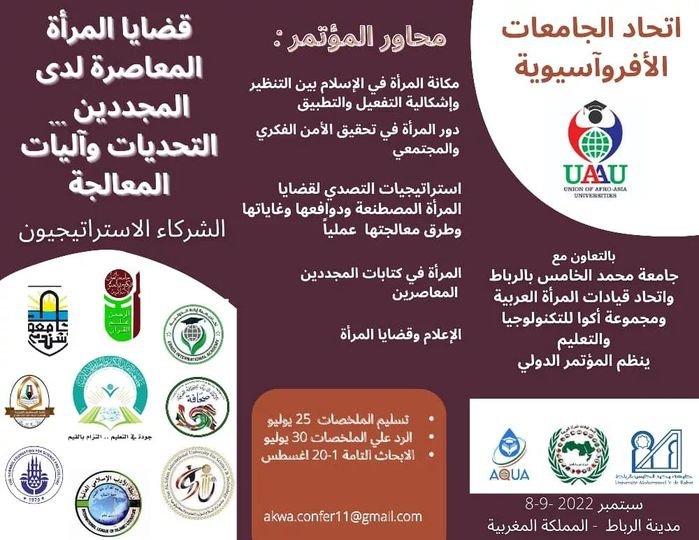Academics and media professionals call for scientific research to address Arab women’s problems and guarantee their right to decision-making
Academics and Media Experts Call for Rigorous Scientific Studies on Women’s Issues in the Arab World
During an online seminar organized by the Media Committee of the conference “Contemporary Women’s Issues Among Innovators: Challenges and Solutions,” held on Thursday evening, scholars and media professionals from the Arab world emphasized the need for thorough scientific research addressing women’s issues in the Arab world. They stressed the importance of providing practical solutions that safeguard women’s rights as guaranteed by Islam, laws, and international treaties.
The participants highlighted urgent social, educational, and economic problems in some Arab countries, including rising divorce rates, family disintegration due to economic weakness, and moral decline due to educational deficiencies. They agreed that social change and increased awareness of women’s rights in the Arab world must come from within, supported by precise scientific research and advocacy to build policies that fully guarantee women’s rights beyond mere slogans or celebratory events.
The seminar also discussed media coverage of the international conference, media handling of its topics, and the role of media in highlighting women’s issues to achieve the conference’s goals of establishing women’s roles in intellectual and societal security in the Arab world.
The “Contemporary Women” conference is scheduled to take place in Fes, Morocco, from September 7-8, and is organized by the Union of Afro-Asia Universities in collaboration with Mohammed V University in Rabat, the Arab Women’s Leadership Union, Aqua Group for Technology and Education, and other strategic partners.
Future Perspectives
Dr. Abdul Karim Al-Wazzan, Head of the Media Committee at the Union of Afro-Asia Universities, urged researchers from all universities, academic institutions, and research and media organizations to address Arab women’s issues. He emphasized tackling the most pressing issues in each Arab country or common problems shared by several Arab countries.
Dr. Al-Wazzan stated that the international conference on contemporary women will cover five key topics: the status of women in Islam between theory and implementation issues, the role of women in achieving intellectual and societal security, strategies to address fabricated women’s issues, contemporary reformers’ writings on women, and the role of media in highlighting and addressing women’s issues and changing their identity and culture.
Dr. Magda Mahmoud, Head of the Media Committee, emphasized the need for rigorous scientific research to provide real solutions for Arab societal problems, ensuring the construction of a safe and stable Arab society for future generations. She warned of the dangers of not addressing social and economic issues scientifically and objectively.
She added that researchers and academics should contribute to providing necessary solutions for economic development, social security, and political stability in the region. Scientific research must lead to practical outcomes and recommendations, and efforts should be made to form lobbies, including universities and media professionals, to press decision-makers to implement these recommendations.
Moroccan poet Malika Taleb recited a poem addressing the reality of women in Arab countries and the challenges they face, especially in conflict-affected regions.
Dr. Hanan Sobhi Abdullah Obeid, Director of International Relations at the London Research Center, stressed the importance of precise scientific peer review of the conference’s research to ensure practical results and recommendations that address Arab women’s issues.
Dr. Zainab Khafaji, Professor of Arabic Literature at Al-Mustansiriya University in Iraq, discussed the impact of internal conflicts on women’s responsibilities and urged collecting opinions from working Arab women to understand the challenges they face and their aspirations.
Dr. Aqeel Khafaji, a member of the conference’s media committee, recommended expanding scientific and research exchange among research centers and academic institutions to maximize the benefits of scientific conferences and reach a broader audience.
Dr. Soheir Safwat, Professor of Social Theories at Ain Shams University in Egypt, highlighted the importance of making scientific conferences accessible to all Arab academics and researchers for broader participation.
Dr. Nihad Mohamed Hassan, Professor of Visual Communication at Ahram Canadian University, called for leveraging digital media’s speed and impact to ensure conference results and encouraged maximum participation from academics and media professionals to achieve actionable outcomes.
The Union of Afro-Asia Universities will also organize the conference on “New Media and Its Role in Community Security and Economic Development” in Morocco shortly before the “Contemporary Women” conference.
At the end of the seminar, Dr. Al-Wazzan and Dr. Mahmoud praised the ongoing efforts of the conference administration and committee members in ensuring the success of the conference. They thanked Dr. Mohamed Al-Ghashi, President of Mohammed V University, Dr. Mokhtar Ahmed, President of the Union of Afro-Asia Universities, Dr. Ashraf Al-Derfeeli, Executive Director of the Union, and Dr. Mohamed Abdel Aziz, Conference Coordinator and Director of the London Research Center, for their contributions to enriching scientific research through international conferences.










